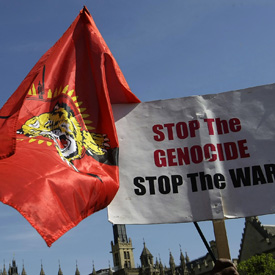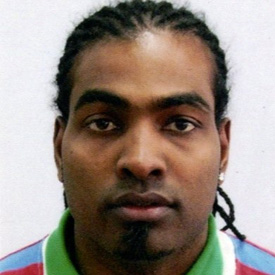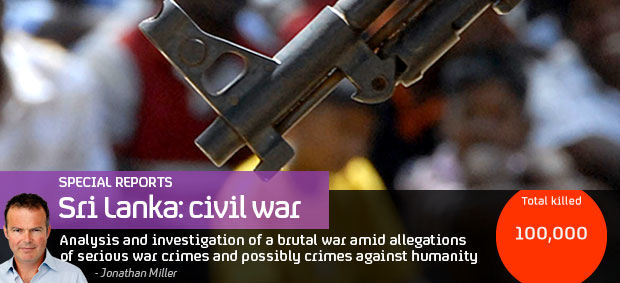UK goes ahead with deporting 42 Sri Lankan asylum seekers
Lawyers fail in attempts to stop deportations, as MPs, human rights groups and lawyers condemn the removal of failed asylum seekers to Sri Lanka.

The deportation of failed asylum-seekers from Sri Lanka, most of them Tamils, the day after Prime Minister David Cameron told MPs that “the Sri Lankan government does need to be investigated” has outraged human rights groups, lawyers and parliamentarians.
The Medical Foundation, which cares for victims of torture, a large number of whom are Sri Lankan Tamils, said: “The survivors we work with have fled the most unimaginable horror in Sri Lanka. They are at serious risk of their trauma being compounded if they are returned to the very state responsible for their torture.”
Tonight, Channel 4 News has learned, from a source inside Sri Lanka’s Criminal Investigation Department at Katunayake Airport in Colombo, that 42 failed asylum seekers arrived on the flight – a far higher number than had been previously thought. A total of 54 Sri Lankans were deported, but the remaining 12 were deported for overstaying their visas.
It is still unclear exactly how many Sri Lankan nationals won last-minute deferrals. Some removals were prevented by orders from the High Court and at least one was stopped by an injunction from the European Court of Human Rights.
“We might as well paint targets on their backs”
The Labour MP Siobhain McDonagh, who yesterday told parliament that by going through with the removal flight “we might as well paint targets on their backs,” told Channel 4 News today that “it’s like we are closing our eyes and pretending it’s not happening”.
“I am shocked,” she said. “Clearly they were just so resolute in their intention to remove them. When they landed, Sri Lankan CID was there, but there was not a single representative from the British High Commission.”
Amnesty International and Human Rights Watch had urged the UK government not to remove the Sri Lankans, most of whom were thought to be Tamils.
Yolanda Foster, from Amnesty International, said: “Nobody should be deported from the UK if they are at risk of torture. We are aware of cases of returned asylum seekers being tortured.”
The Hong Kong-based Asian Human Rights Commission has today published a report detailing 323 cases of individuals allegedly tortured while in police custody in Sri Lanka.
A number of appeals for judicial review and injunctions were launched by lawyers acting for the failed asylum seekers after claims that a number of those due to have been deported had had evidence, which could leave them subject to interrogation, passed by the UK Border Agency to the Sri Lankan authorities in Britain.
Karim Assaad, of Ravi Solicitors, who succeeded in winning a stay for one of his clients, said what had happened “has left the world asking: What will it take for the UK Government to finally admit that their direct actions have placed those deported at significant risk of their lives on return to Sri Lanka?”
Watch "Sri Lanka's Killing Fields", presented by Jon Snow

Detainee who attempted suicide wins reprieve
Three of those whom the government had sought to deport yesterday claimed to have received death threats by telephone in the hours before their planned departure.
One of them was a man whom the British government attempted to deport despite acknowledging that just hours earlier, he had tried to hang himself, fearing he would be tortured and murdered were he to be deported.
The 31-year-old man, Nagendrarajah Suthakaran (pictured above), was among a handful reprieved by a last-minute High Court order, and removed from the chartered aircraft just before take-off from Gatwick Airport last night. He is understood to be recovering in Harmondsworth Immigration Removal Centre near Heathrow.
"I tried to die. That was better for me. But then I found that I was being revived so that I can be killed by torture in Sri Lanka. I don't feel any animosity towards anyone but I cannot understand why the British authorities saved my life only to send me back to where I would be killed."
Read more in Jonathan Millers exclusive interview with Nagendrarajah Suthakaran
Deported man ‘let down by legal process’ says lawyer
One of those who was deported is a man who possesses documentation from the International Committee of the Red Cross stating that the ICRC visited him in detention on three occasions in Sri Lanka in the past.
Medical reports he obtained in the UK state that marks on his body are highly corroborative of his claims to have been tortured. He is understood to have absconded while on bail, having been accused of having links to the Liberation Tigers of Tamil Eelam.
In Home Office country guidance on Sri Lanka, scarring and past attempts to have sought asylum abroad are recognised to increase the personal security risks faced by those returned to their homeland.
I spoke to the man several times on the telephone from his detention centre prior to his removal. We have chosen not to reveal his name. Jan Doerfel, the barrister acting for him in the UK, said:
“I feel that the legal process has let him down. I am seriously concerned about his safety in Sri Lanka. He had very strong evidence that he had been tortured in the past and incontrovertible evidence that he had been detained in Sri Lanka, and visited by the ICRC.”
Channel 4 News has learned that the Sri Lankan government, which took statements from the returnees at the headquarters of the Criminal Investigations Department in Colombo on arrival has now released them. We have been unable to determine whether any organisation is currently monitoring the fate of the returnees.
On Tuesday, the Home Office released a statement to Channel 4 News saying: “Returns to Sri Lanka will only be undertaken if we are satisfied that the individual has no protection needs. The improving political and security situation in Sri Lanka has meant it is safe to remove people there.”
